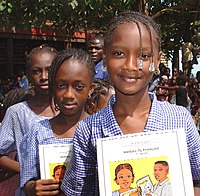
Photo from wikipedia
Conventional civic educational efforts in the lower grades often frame young children as “future” citizens who need to learn nationalistic patriotism, obedience to rules and laws, and trust in civic… Click to show full abstract
Conventional civic educational efforts in the lower grades often frame young children as “future” citizens who need to learn nationalistic patriotism, obedience to rules and laws, and trust in civic institutions to operate fairly toward all members of the community. In this paper we present a framework of “critical civic education” at the early childhood level that positions children as already civic beings with identities and experiences that inform their ideas about what problems matter and how they can be solved. We ask educators to help young children develop (a) a general understanding of current injustices (along with root causes) within their communities, (b) the ability to articulate and reflect on their own conception of an ideal society that advances human flourishing, and (c) strategies to advance their ideas. Through three vignettes we offer examples of how early childhood education can engage in this type of critical civic education.
Journal Title: Multicultural Perspectives
Year Published: 2019
Link to full text (if available)
Share on Social Media: Sign Up to like & get
recommendations!